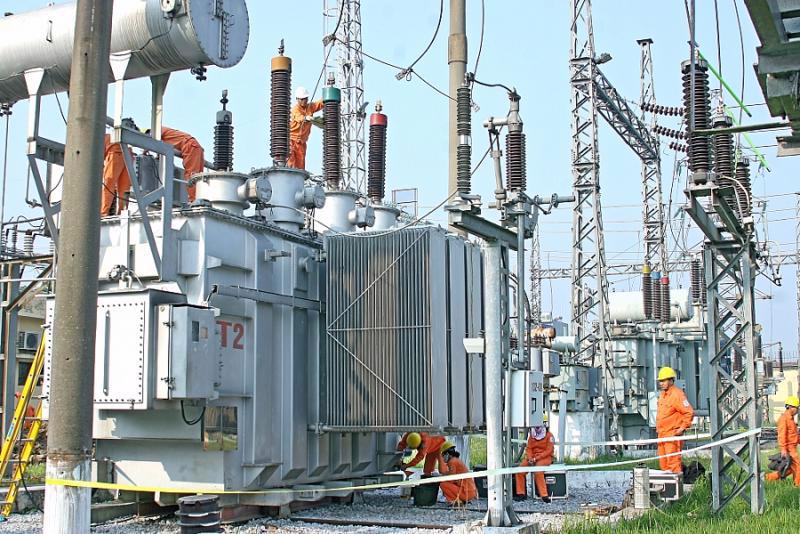Addressing a meeting between Prime Minister Pham Minh Chinh and foreign-invested enterprises (FIEs) at the annual Vietnam Business Forum (VBF), held on March 19 in Hanoi, representatives from foreign business associations in Vietnam all expressed concern about power shortages similar to those experienced in the summer of 2023.
Chairman of the American Chamber of Commerce (AmCham) in Hanoi, Mr. Joseph Uddo, said electricity supply for production is the greatest concern of US investors in the country.
“Without electricity that is reliable, affordable, and sustainable, many of the goals discussed today will be difficult to reach,” he said. “The one thing that ties all businesses and any future investors together is the need for energy reliability and immediate access to renewable energy.”
According to Mr. Uddo, AmCham encourages continued dialogue between the Ministry of Industry and Trade (MoIT), Electricity of Vietnam (EVN), and private sector stakeholders to explore viable short-term and long-term solutions for Vietnam to meet its energy security needs, including the faster approval of large liquefied natural gas (LNG) projects supporting energy security and transition goals.
“Energy infrastructure does not happen overnight and planning for Vietnam’s sustainable growth needs to take place now,” he went on. “We need to see regulatory uncertainties eliminated and a renewed focus on approving projects in the short term that are realistic and bankable to ensure power supply meets the growing demand.”
Greater access
Foreign investors seek more streamlined regulations on gaining access to renewable energy, as many new investors and expansion projects need assurances about reliable energy supply if they are to invest in Vietnam.
Mr. Uddo suggested that the implementation of the National Power Development Plan VIII (PDP8), the development of a decree on rooftop solar development, access to renewable energy in industrial parks, and guidance on the direct power purchase agreement (DPPA) mechanism are pivotal.
“We are encouraged by signs that DPPAs could be launched on July 1, as our members - both investors and customers - support the fastest implementation of this long-awaited program,” he said.
Similarly, Mr. Hong Sun, Chairman of the Korean Chamber of Commerce in Vietnam (Kocham), said numerous areas in Vietnam’s north, such as Bac Ninh, Hai Duong, Ha Nam, Phu Tho, and Vinh Phuc provinces, experienced power shortages last June and July, with industrial parks in these areas implementing scheduled power cuts once or twice a week.
The Vietnamese Government acknowledges that power shortages pose a significant obstacle to attracting foreign investors and enhancing manufacturing competitiveness among Vietnamese companies, Mr. Hong Sun added. “Efforts are being made to formulate countermeasures, but the situation is challenging to resolve in the short term,” he believes.
South Korean companies, especially those in high-tech industries such as semiconductor manufacturing that are looking to enter Vietnam, have identified power issues as a significant factor delaying their investment decision. “This sentiment is shared by other global companies in advanced industries the government hopes to attract,” he said, adding that South Korean companies expressing a keen interest in technology-intensive industries that align with environmental trends, such as rooftop solar power projects, are reluctant to proceed with investments due to unstable power supply and unclear regulations.
“We respectfully ask for the establishment of effective measures to ensure stable power supply within industrial parks, so that FIEs, including those from South Korea, can confidently engage in manufacturing activities,” Mr. Hong Sun said.
Steady implementation of PDP 8 needed
According to Mr. Muto Shiro, Deputy Chairman of the Japanese Chamber of Commerce and Industry in Vietnam (JCCI), the early development of a legal framework and implementation guidelines is necessary for the execution of power development projects, including laws related to the use of sea areas for large-scale offshore power projects, relaxing eligibility conditions for DPPAs in renewable energy projects, and reviewing the existing pricing mechanism for biomass / waste power generation, while the PDP8 must be steadily implemented.
A position paper from the JCCI noted that it is also important to prioritize introducing policy measures for large-scale renewable energy projects, especially offshore wind power projects, which have significant potential in Vietnam. It proposes the participation of foreign companies and financial institutions with expertise in such projects, to ensure their timely implementation.
The JCCI also believes it is essential to secure baseload power sources to support the transition to renewable energy, according to the paper, adding that gas and LNG thermal power are transitional energy sources for Vietnam. It confirmed that Japan would like to expand its assistance and contribute to the realization of gas and LNG thermal power in line with PDP8.
It suggested that the Vietnamese Government consider stabilizing power supply at industrial parks, provide adequate notice about upcoming power cuts and power saving requirements to help businesses adjust production plans, and adopt preferential policies to encourage companies to both save and produce electricity.
Deputy Minister of Industry and Trade Nguyen Sinh Nhat Tan said the ministry has policies in place to promote the energy transition in a green, clean, and sustainable manner, with an increase in the proportion of renewable energy while lessening the use of imported fuel and fossil fuels, in line with national energy plans approved by the Prime Minister.
“Regarding the PDP8, the ministry has built an implementation plan that is expected to be approved soon by the government,” he said.
The ministry has also introduced technological solutions to ensure the harmonious development of new energies and renewable energies and promoting the integration of renewable energy into the national grid. In particular, it has built mechanisms to facilitate power development and new sources, such as hydro power and offshore wind power, he said.
He added that the ministry is following directions from the Prime Minister on measures to prevent power shortages.
“We can confirm and commit there will be no power shortages in 2024 or possibly in the following years,” he said. “We also commit to ensuring stable power supply of good quality.”









 Google translate
Google translate